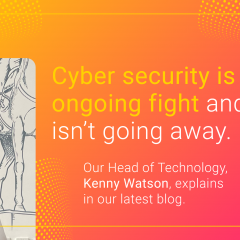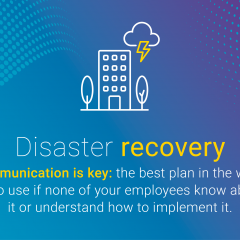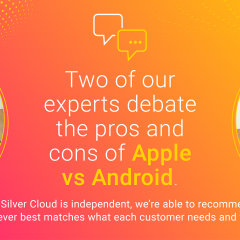Changing places
Before March 2020, few businesses had thought much about home- and remote working, so when Covid hit they had to adjust quickly. And then, after the initial crisis phase, they had to figure out how to make permanent changes to their ways of working. We sat down with Silver Cloud Smarter Technology’s CEO, Tony Quinn, and asked him about how the mindset has changed – both for our customers and in our own business.
When you started the business in 2014, did you think about home working at all? Was it something that you ever imagined you’d introduce?
Not at all. And it was similar with our customers. A few people were starting to talk about it, but no-one was actually introducing it.
Was that because the technology wasn’t ready yet?
It was more that the mindset to do it wasn’t there. Employers usually didn’t have a problem finding good people, so there was no real need to change. Businesses also didn’t know how to build a culture with people working remotely.
That’s more important than technology, really, because if the mindset is there, the demand is there, then the technology will follow.
Then everything changed in March 2020. Was it difficult to move Silver Cloud to homeworking?
Not at all. The technology we had in place meant that we could move to homeworking without really thinking about it. Other than tightening up on security, we didn’t have to do anything. All our systems were in the Cloud, all of our communications too. So it was literally, ‘Take your laptop home and you’re good to go.’
Obviously a sudden change like that is going to affect your operational rhythm a bit, but the technology wasn’t a problem.
What about with customers?
Different ones had different requirements. A lot of our customers are NHS practices, who weren’t working from home, but had to deal with a much increased demand on phone calls.
Of those who did need to introduce homeworking, some already had the necessary infrastructure in place, or most of it, and some didn’t. But in the end, it all went relatively smoothly.
What about the situation now? How are businesses adapting to the fact that many employees now expect to be able to do at least some homeworking?
Obviously every organisation is different, but I’d say that generally you see a big difference in businesses above and below about 100 employees.
A lot of the smaller ones haven’t yet figured out how to adapt – they’re maybe a bit stuck in the old ways. Generally you think of smaller organisations as being more nimble and able to respond faster to changes, but that isn’t always the case.
It’s a culture thing again. If people haven’t figured out how to train people, develop them, and get the job done, that will hold them back. Also if the boss is old school and likes to see people – to walk in and see a busy office.
The technology is already there. Everyone knows how to use MS Teams now.
Why have bigger businesses tended to adapt faster in this case?
Because they don’t have a choice. If they want to recruit staff, if they want to grow, if they want to progress as a business, they have to offer homeworking.
The competition for employees is much higher in these larger organisations, and people are asking for it – demanding it, even. I spoke to someone recently who manages a team in a big finance sector company, and she said that someone in her team had come to her and basically said, ‘If I can’t work permanently from home, I’m going to leave.’
So big employers have to adapt whether they like it or not. And anyway, remote working has huge advantages for employers too: for example it means that they can now recruit globally. Your employees don’t even need to be in the same country.
What is Silver Cloud’s homeworking arrangement at the moment?
We’ve got a hybrid arrangement. People have the option to work from home up to two days a week.
When you introduced it, did you set a lot of formal rules?
We decided not to do that. Honestly, we didn’t know how it would go. So we said to people, ‘We’re going to set this up on an informal basis with some guidance for what we’d like you to do (we called it our ‘Etiquette’), and if that doesn’t work we’ll change to a more rigid system.’
As it turned out, everything worked really well. We’re not finding any less output, we’re not finding management challenges, the job’s getting done.
What were the Etiquette rules?
Just half a dozen or so things like, If you come to the office then be dressed accordingly. If you come in for a meeting then stay in the office for the rest of the day. Tell your manager in advance when you’ll be in and out. Common sense things.
And all that has been followed. We’ve really not had to think about it.
Finally, to go back to the big picture, do you think the situation will stabilise now?
In terms of homeworking, yes, but things are always changing. For example, the idea of a four-day working week is getting a lot more attention lately. So businesses need to have the right technology and systems in place that let them respond quickly: like we did with having everything in the Cloud when Covid happened. You don’t have to predict the future, you just have to be ready to adapt to the unexpected.










